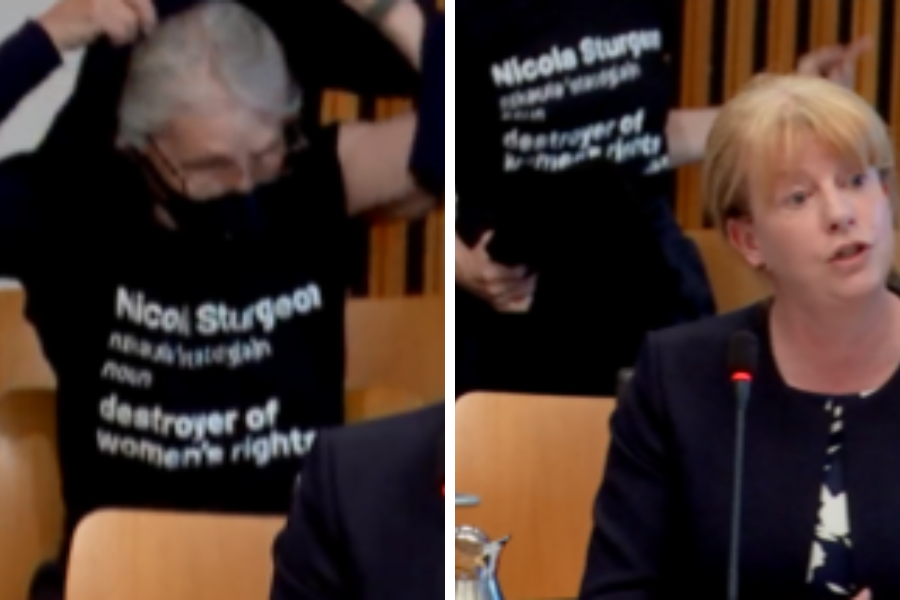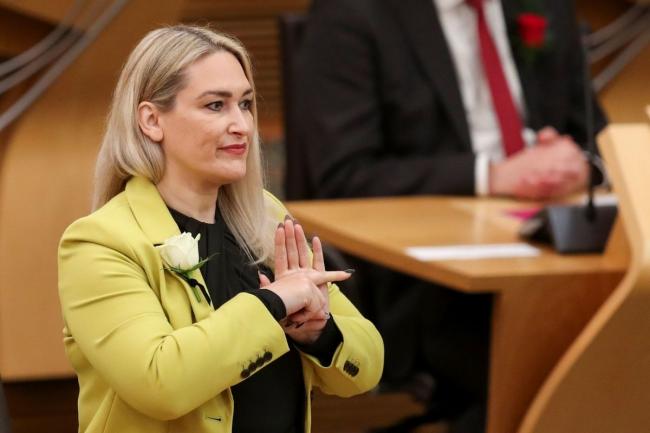
WOMEN opposed to making it easier for trans people to legally change their sex have disrupted the final GRA Bill evidence session at Holyrood, by revealing T-shirts branding Nicola Sturgeon a “destroyer of women’s rights”.
While Social Security Secretary Shona Robison gave evidence on Tuesday anti-GRA campaigners were in the public seats as they removed layers of clothing to unveil tops reading “Nicola Sturgeon: Destroyer of women’s rights”.
The first woman took off her jumper around half an hour into the Equalities Committee session, as the minister answered questions from MSPs.
She was promptly asked to leave by a member of staff and appeared to go along with the request. Other women wearing the same shirt also left around the same time.
The committee session was suspended briefly but continued with Robison giving evidence alongside Peter Hope-Jones, head of the Gender Recognition Unit.
A Scottish Parliament spokesperson said: "There was a brief disruption in the public gallery and some members of the public were asked to leave."
Women campaigning against the GRA reforms took to Twitter on Tuesday to show the anti-Sturgeon shirt on Greyfriars Bobby, along with Suffragette-coloured bows.
With the final meeting of the committee hearing evidence regarding reform of the GRA, women across Scotland are letting @NicolaSturgeon our feminist to her fingertips @ScotGovFM know exactly how they feel #SturgeonDestroyerOfWomensRights #SummerOfDiscontent pic.twitter.com/bzgU1eFnfA
— Scottish_Feminists (@Scot_Feminists) June 28, 2022
After the incident at the Scottish Parliament, one of the women involved said: "When our FM refuses to listen to our concerns, we had no choice but to peacefully protest. To be denied the chance to do that sums up how little of a voice women have in Scotland right now."
But Beth Douglas, the co-convener of the pro-GRA reform Rainbow Greens group who was also present at Tuesday's evidence session, criticised those involved in the stunt.
"I'm incredibly shocked that gender critical activists repeatedly interfered with the proceedings of the Equalities, Human Rights & Civil Justice Committee at the Scottish Parliament today over the GRA reforms," she wrote. "They do not have respect for Scotland's democratic process."
Opponents to the Scottish Government’s legislation claim that changing the gender identification process would threaten single-sex spaces, and could open the door to predatory men changing gender with the intention of attacking women and girls.
But throughout the evidence sessions at Holyrood, experts have argued that this is not the case. Last week Regina Doherty, the leader of the Irish senate – where gender self-ID was brought in back in 2015 – said the idea of men using the bill to pretend to be women and attack them is “fanciful”.
Barbara Bolton, the head of legal and policy at the Scottish Human Rights Commission, added that they could not identify “any objectively evidenced real and concrete harm” likely to come from the bill.
She added: “The majority, if not all of the concerns that have been outlined, do not appear to have a relationship with the proposals that are set out in this bill.”
A number of figures opposed to self-ID were also invited to give their views on the bill at committee stage, including the co-director of For Women Scotland, the head of research at the LGB Alliance and the director of Keep Prisons Single Sex.
During Tuesday's session, Robison told MSPs that patients will still be able to be seen by a same-sex health professional if requested under gender recognition reform proposals.
The minister said: “The NHS does try, where it can, to give people their wishes in terms of if they want a man or a woman in terms of care, whether its personal care delivered by social care staff or whether it is a smear test, or whatever the procedure.
“If a patient specifically requests a doctor or nurse of the same gender, then of course, the NHS will try to accommodate that as far as possible.
“There are obviously never any guarantees for that because of the availability of staff with appropriate skills to manage the patient’s condition.”
She added: “We’re talking about very hypothetical situations here. I can’t imagine that most people, particularly in the caring professions, would want to do anything other than have the person’s wishes respected."
SNP MSP Karen Adam (below) interjected to raise concern over the language of referring to transwomen as “biologically male” which has previously been used as a “transphobic dog whistle”.

She also told MSPs that transgender individuals would not change the protections around same-sex spaces, such as women seeking private sessions on rape or sexual assault.
And she said trans people had been using bathrooms and changing rooms of their choice for many years – a reform in a GRC would not change that.
The minister also recognised concerns around detransitioning – where trans people could return to the gender they were assigned at birth.
Fears have been raised that those who want to detransition, while rare, may be criminalised for up to two years’ imprisonment.
Robison said the individuals doing so “were not making a false declaration” at the time of applying for a GRC and therefore would not face punishment.







